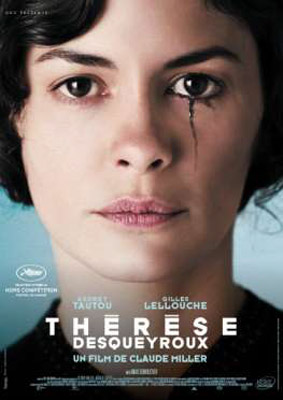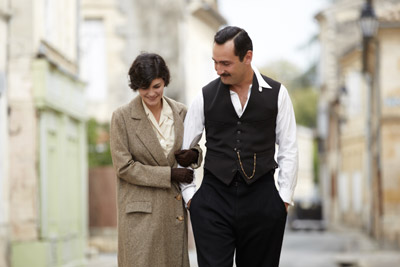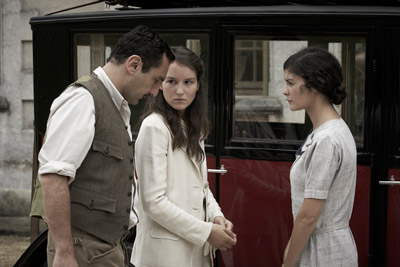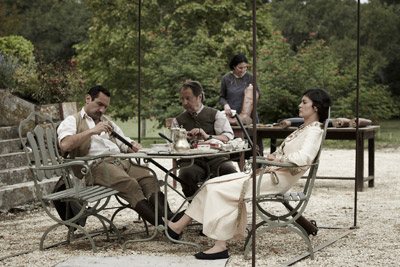Claude Miller Thérèse D Interview

Claude Miller Thérèse D Interview
Cast: Audrey Tautou, Gilles Lellouche
Director: Claude Miller
Genre: Drama
Running Time: 110 minutes
Synopsis: When a marriage of convenience proves to be less than that, the free spirited Thérèse finds herself stifled by the surroundings of 1920s provincial France and the intellectual mediocrity of her husband (Gilles Lellouche).
Based on the novel by François Mauriac, the film stars Audrey Tatou as the truly toxic Thérèse Desqueyroux. Her plans to end her life with husband Bernard are based on ending his life completely. After he accidently overdoses on his medicine (Fowler's Solution, which contains arsenic) his wife is inspired to replicate the treatment until suspicions are aroused and she faces trial for his attempted murder.
Release Date: April 11th, 2013
Interview with Claude Miller
Question: How did 'Thérèse Desqueyroux" come to be?
Claude Miller: After we had each made two or three films, Yves Marmion – who had already produced 'Un Secret" (A Secret) based on the book by Philippe Grimbert – wanted to adapt a work by Mauriac with me. He was thinking of 'Désert de l'amour" but I wasn't very fond of that book – I found it outdated and the premise didn't interest me. When I was a student, however, one book really grabbed me: 'Thérèse Desqueyroux." I reread it. Everything I like in a movie was there. In 'Thérèse Desqueyroux" there is an ambiguous atmosphere that requires the viewer to actively engage the film. But before thinking about adaptation, I had to come up with an actress to play Thérèse. My costume designer Jacqueline had started a style book to show me how people dressed back then, and among the documents was that extraordinary portrait of Audrey. It was exactly the idea I had in mind for Thérèse.
Question: Women have often been the driving force in your films.
Claude Miller: For me cinema means filming people who are sufficiently mysterious to fascinate and seduce the viewer, even if they behave badly; that's the erotic side of it. And filming women contributes to that eroticism for me. Men interest me less, maybe because I think I know them better. I enjoy myself much more the minute a woman is on the set. That reminds me of a line by Céline in 'Mort à crédit." Ferdinand Bardamu meets an old friend he hasn't seen in years, and says, 'You seem so sad. Why?" His friend answers, 'I was in the metro. I'm sad because there wasn't a single woman in the metro. I guess that's how I am. I'm sad when there aren't any women in the metro."
 Question: You really make the character of Thérèse mysterious. Despite her interior turmoil, she is almost terrifyingly 'smooth."
Question: You really make the character of Thérèse mysterious. Despite her interior turmoil, she is almost terrifyingly 'smooth." Claude Miller: It was the best way to portray the tragedy that young woman lived through. That's not how things should be, thinks Thérèse, and look what happens: she poisons her husband. The conventional thinking she was raised with pushes her to such absolute absurdity that she takes it to the point of putting herself in danger with the law. There is a Simenon‐like quality about her that I love. Having certainty as a young girl makes it all the more tragic. She really thinks she can be happy married to Bernard Desqueyroux. 'I'm going to get married; it will help me get my head on straight. I've chosen peace," she says to Anne, her future sister‐in‐law. She has crazy ideas but has decided of her own will to push them aside. She is an intellectual, raised by a radical father; she must have done a bit of reading. Even if it was rarely talked about, there was a stark division in society back then between the left wing, even the very rich and high society among them, like Thérèse's family, and the right wing. Her sharp mind and free spirit are encouraged by the personality of her aunt Clara, who never married. Aunt Clara is important to Thérèse for that: it's very likely that she refused the matrimonial conditions that were proposed to her. She preferred to continue to live at home, in the family house. Despite all that, Thérèse's urges remain suppressed until she meets Jean Azevedo, played by Stanley Weber, and her discovery of the affair he is having with her sister‐in-law. He is handsome, rich, cultivated and Jewish, thus undesirable in the eyes of the bourgeoisie; he has what it takes to awaken the revolt that sleeps within her. He shows up in a sort of visual splendour – we did this intentionally, of course – the place, the boat, the red sail, the music...
Question: There is a lot of sensuality between Thérèse and Jean.
Claude Miller: They end up speaking on pretty much theoretical terms. The fact that Thérèse was pregnant was a problem for me and my co‐writer Natalie Carter. At that time, it was unthinkable for a pregnant woman to have desire. It was kept hidden. Thérèse has even lost all her individuality being pregnant. She says, 'In my husband's eyes, all that matters is the fruit of my entrails." That quote from Mauriac is so telling, so touching. I set that scene in a location with greenery reminiscent of the couple's idealized early relationship; things have really changed for them since then.
Question: Thérèse has no maternal instinct.
Claude Miller: Do you love your child when you don't love the person you had the baby with? That's a really interesting subject to take on, especially for women. It's a problem for Thérèse. What bothers and hurts her is how Bernard treats her regarding the child.
Question: In 1927, François Mauriac's novel raised a great debate. Here you have completely absolved your heroine.
Claude Miller: Yes, she has been forgiven. As she says to her father: there was no victim, so there is no crime. There is a certain logic in that.
Question: What is it like to direct Audrey Tautou?
Claude Miller: I would tend to say – and I'm not just oversimplifying – that you don't direct great actors. They propose things to you, and ninety percent of the time they hit on what is needed. How do you explain that? It is the combination of a script, a subject, and a character. You never work the same way; the way you direct depends on the actor. With Audrey it was especially magical. How can I say it? Maybe she managed, even more quickly than the others, to hit a note that I liked, which was the one I had imagined.
Question: Did you watch the 1962 adaptation by Georges Franju again before working on the script?
Claude Miller: No. Even though Franju belongs to what I call my student favourites, I didn't want to do that – I am too easily influenced. I remembered it being a good film, very respectful to the structure of François Mauriac's book.
Question: Whereas you have turned it completely upside down.
Claude Miller: Mauriac's novel begins after Thérèse has been acquitted and proceeds in flashback: Thérèse relives her memories up until that night when she walks out of the courthouse. I didn't want to construct my film that way. Today flashback structure has really become a structure for Saturday night made‐for‐TV movies. And this story was absolutely tellable in linear form. It even made it more powerful. It allowed us to feel closer to Thérèse.
Question: You made other changes. Bernard Desqueyroux, the husband, is infinitely more generous with Thérèse.
Claude Miller: In the novel, he was more brutal and provincial, more rigid and attached to family values. To keep him that way would have ruined all the mystery of Thérèse; her decision to poison him would have seemed more justified. Whereas now we are forced to think, 'Oh, she is going to put drops in his glass..." There is intentional suspense, noble suspense, Hitchcock‐style.
 Question: You made Desqueyroux a hypochondriac. You made him fragile, and more touching that way.
Question: You made Desqueyroux a hypochondriac. You made him fragile, and more touching that way. Claude Miller: He is sick, he is in bed, he is ugly, he sweats and he vomits. For me to have empathy for a man, he really has to have it bad!
Question: Gilles Lellouche is absolutely brilliant in the role.
Claude Miller: It's funny the way we met, he and I. I was member of the jury at the festival of Marrakech. At check in, on the way there, Gilles was in front of me. I observed him for a good half an hour, during boarding. And I found myself standing face to face with him. Instinctively, I handed him the script. In Marrakech, we hardly saw each other – there were plenty of parties but we weren't running with the same crowd. But he did call me when he got back. He wanted to do the film. Who else could play Bernard? Gilles is great at playing the rigidity of a man raised with staunch family traditions, and at the same time filters into him all the love he feels for his wife. He is a victim too. But life, for him as well as for her, isn't having it his way.
Question: The real guilty party is the bourgeoisie.
Claude Miller: It's the power of the family institution, that deceptive incarceration that holds everyone in prisons that they have imposed upon themselves for generations on end. It's not even a topic of discussion – you keep things to yourself.
Question: It is even more surprising when husband and wife unite to stand up to the law.
Claude Miller: That is the result of the way they have been raised. Despite what she has done, and what he has lived through, they have to face it together. They were brought up that way. And despite her actions, Thérèse bows to convention.
Question: There is that superb scene, the dream sequence where Thérèse is smoking a cigarette while a raging fire surrounds the Desqueyroux property.
Claude Miller: I filmed that scene to be dreamlike but it could be misunderstood. I wouldn't want people to think that Thérèse started that fire. There is an ambiguity that perhaps wasn't necessary but which I like nonetheless and wouldn't take out for anything in the world. Like when she jumps out of the train when she comes back from Baden. That woman is constantly in control. Her violence never comes out. Except in dreams.
 Question: The end of the film really shines.
Question: The end of the film really shines.Claude Miller: He opens the birdcage and says to her, 'You're on your own." It is a real expression of love – I think he was always in love with his wife. I like that ending – a valiant ending. I did almost the same thing in 'La Petite Voleuse." She was pregnant and went out to meet her fate. This one works even better, maybe. I think the most beautiful moments in life are when you can regain your freedom while forgiving your partner. And those two have forgiven each other. This will be my first film to have a happy end.
Question: Catherine Arditi, who plays Madame Desqueyroux the mother, and Isabelle Sadoyan, who plays Aunt Clara, are pretty exceptional in their supporting roles.
Claude Miller: The first was a necessity from the start. The second, I spotted in a play – 'Conversations avec ma mère" – directed by Didier Bezace. It was obvious Isabelle was Aunt Clara. I also really like Francis Perrin in the role of Laroque.
Question: Tell me about Anaïs Demoustier, who does a brilliant job of playing Anne, and Stanley Weber, who plays Jean.
Claude Miller: I'm like all directors. As soon as I see a movie and notice someone like Anaïs Demoustier, for example, I think, 'Hey, she does wonderful work," and note down her name. I have two notebooks: one for actresses and one for actors. When I don't have immediate certainty, I get out my notebooks.
Question: There is often sadness in your films, particularly in this one.
Claude Miller: The fact that I was ill – because I was already ill then – probably creates a sense of melancholy. I wasn't all hurrahs, and that must have factored in. Not on the set, because it was a pleasant shoot with happy people. But let's just say I wasn't the happiest of the bunch. I knew I had to check into the hospital once we finished the film, and that distressed me.
Question: Did that change the way you made the film?
Claude Miller: It didn't change the way I work and it didn't keep me from doing it well, but it gave me a sort of freedom. I was less obsessive and anxious than usual because I had to deal with something more serious than a film. That's the truth.
Question: You have made seventeen films, but only two are original screenplays.
Claude Miller: Yes, because a film is three or four years of my life and I want to dedicate them to something I really feel strongly about. I am too critical of myself, of what I write; I'm always thinking, 'It's crap!" If I do Mauriac, I have a minimum guarantee of quality.
Question: That doesn't keep you from adapting your subjects freely.
Claude Miller: I've been told that I have nerve, and it's true that from the moment I begin, I'm like a vampire; I'm a thief. I do whatever I like. Adaptation is absolutely fascinating. For better or worse, it's what I prefer. I've always made the films I wanted to make.
MORE
- Mission: Impossible Fallout
- Glenn Close The Wife
- Allison Chhorn Stanley's Mouth Interview
- Benicio Del Toro Sicario: Day of the Soldado
- Dame Judi Dench Tea With The Dames
- Sandra Bullock Ocean's 8
- Chris Pratt Jurassic World: Fallen Kingdom
- Claudia Sangiorgi Dalimore and Michelle Grace...
- Rachel McAdams Disobedience Interview
- Sebastián Lelio and Alessandro Nivola...
- Perri Cummings Trench Interview



